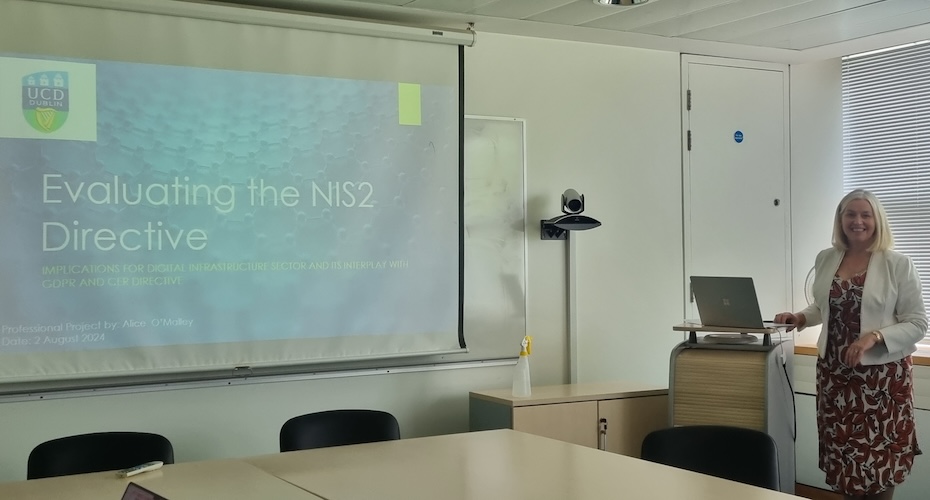MSc Cybersecurity Research Project Presentations 2024
News
- PhD Poster Event 2026
- Second cohort of students conferred with MSc in Cybersecurity
- SECURENET 2026
- Second BDIC Conference on Computer Science and Electrical/Electronics Engineering
- Funding for Research on Resilient Robotic Teleoperation over Open RAN
- Transforming Survivor Centred GBV Response Using Human Centred AI Agents
- UCD NetsLab Launches CollabXR: A 6G-Enabled Haptic Collaboration Project
- UCD COMPUTER SCIENCE STUDENT WINS HUAWEI TECH ARENA 2025
- UCD School of Computer Science Medal Winners 2024–2025
- AI2PEAT WINS NATIONAL CHALLENGE FUND PRIZE
- UCD NetsLab Wins Best Paper Award at IEEE CNS 2025
- Students achieve outstanding results in Web Intelligence Classification Challenge
- Conferring of degrees June and September 2025
- CS News 2025
- SECURENET 2025
- EoI for Postdoctoral Fellowships 2025
- “Back to the Future” Advanced AI Careers Evening
- SOLARIS Shortlisted for Best Research Project at the 2025 Education Awards
- First global carbon neutral conference in ICT for Sustainability
- ARMOR: Advancing AI-Driven Security for 6G Open RAN Networks
- AI research and education at UCD and career opportunities in Ireland
- Political Bias on X before the 2025 German Federal Election
- A new Book co-authored by UCD CS Assoc. Prof. Madhusanka Liyanage Explores the Foundations and Applications of Mobile Edge Computing
- UCD NetsLab Leads a Global Consortium to Tackle 6G Security Challenges
- First students conferred with MSc in Cybersecurity
- Second Workshop on the Responsible Use of Generative AI in Research
- First BDIC Conference on Computer Science and Electrical/Electronics Engineering
- Paul Gillen - global leader in the fight against cyber crime
- CS students awarded Naughton Foundation Scholarships
- First Workshop on the Responsible Use of Generative AI in Research
- Dr Brett Becker (1976 - 2024)
- UCD Computer Science Researchers Receive ReCLAIM Award for GenAI Project
- MSc Cybersecurity Research Project Presentations 2024
- UCD BSc Computer Science Conferring 2024
- UCD NetsLab Launches ORAN Testbed to Advance Security and Privacy in Beyond 5G and 6G Networks
- UCD CS Netslab researchers in a global collaboration to bolster Zero Touch security and privacy for 6G networks
- UCD STEM Early Career Researchers Symposium
- EoI for Postdoctoral Fellowships 2024
- CS start-up a finalist in VentureLaunch Accelerator Programme
- University College Dublin Joins ROBUST-6G Project
- Cyberwise Cyber Security Shared Learning Day
- 2nd Summit on Security and Privacy in Future Mobile Networks (SECURENET) 2024
- Message from the Head of School
- Ulysses Medal Awarded to Professor Geoffrey Hinton: The Godfather of AI
- UCD CS academics invited to organise prestigious Dagstuhl seminars
- UCD College of Science Women in Science Mentoring Awards
- PhD Poster Event 2024
- “Back to the Future” Software Engineering Evening
- Improving resilience to the threat of coastal flooding
- Alumnus In Conversation - Fergal Reid, VP of AI at Intercom (PhD 2013)
- Computer Science Summer School
- Welcome to CS News 2023
- EoI for Postdoctoral Fellowships
- EU MSCA SE RE-ROUTE Project Kicks Off to Design Futuristic Multi-Modal Transportation Platform
- PhD Poster Event
- UCD wins at AI Ireland AI Awards
- UCDCS Athena SWAN Award
- Jan Łukasiewicz
- International Men’s Day
- 1st Year BSc Halloween Networking Event
- Ada Lovelace Energy Hackathon
- 5G for digital healthcare in COVID-19
- UCD CS Faculty Elected Vice Chair of ACM SIGCSE
- CS Big Data project for strategies to combat childhood obesity recognised for its innovation potential
- Welcome to CS News 2022
- UCD CS to host the 27th ACM Innovation and Technology in Computer Science Education
- UCD Computer Science Success in SFI Frontiers to the Future
- Why study Computer Science at UCD?
- CAMEO project receives funding from the Disruptive Technology Innovation Fund
- Congratulations to the Class of 2021 - MSc Forensic Computing & Cybercrime Investigation
- Computer Science Colleagues’ success in Interdisciplinary Research Scheme
- ML Labs Annual Newsletter
- Seagate CORTX Challenge
- UCD Academic awarded the 2021 Beijing Great Wall Friendship Award
- Recent funding successes and industry collaborations
- EU H2020 SPATIAL project
- recsyslabs - privacy preserving personalisation for publishers
- Congratulations to our recent PhD graduates
- UCD In Conversation: Cybercrime causes, trends, and prevention
- CS researchers partner in three successful Disruptive Technologies Innovation Fund projects
- Welcome to CS News, the new UCD CS magazine
- Congratulations to our recent PhD and research MSc graduates
- New book showcases digital forensic research by UCD law enforcement graduates
- Training the next generation of Computer Scientists
- Industry Partnership Event to showcase new research on using machine learning
- Poems that Solve Puzzles: The History and Science of Algorithms
- A welcome to incoming first year Computer Science students
- Zoom for Thought with Prof. Muthoni Masinde
- iPROCEEDS-2: Starting of the long-distance master programme on forensic computing and cybercrime investigation
- Short Term Contract Positions Opportunities
- Most Influential Paper Award at the 28th International Requirements Engineering Conference
- From the School of Medicine in partnership with the School of Computer Science
- 2nd Workshop on Implementing Machine Ethics on 30th June
- CeADAR receives Enterprise Ireland Funding for a new Supercomputer
- Assistant Professor Brett Becker awarded Research Fellowship
- UCD CS Masters Student wins prestigious Intel Student Scholarship
- Navigating COVID19 data with a little help from a tame data scientist
- PhD Positions
- UCD Computer Science Project Nominated for Two Education Awards
- Vacancies - Lecturer/Assistant Professor in Computer Science (x2)
- Ad Astra Fellows - Applications to Computer Science
- CALL OPEN - PhD Scholarships 2020 in Machine Learning
- Commissioner of An Garda Síochána visits the School of Computer Science for Conferring
- Computing Education Group SIGCSEire to launch in UCD on December 11th
- UCD Computer Science wins over €34m in Research Grants in 2018-19
- UCDCS Best Short Paper award 13th ACM Conference on Recommender Systems (RecSys)
- CS Sparks Programme
- CS Sparks
MSc Cybersecurity Research Project Presentations 2024
The first cohort of our new MSc Cybersecurity programme are now completing their studies and are due to graduate in December. Some of them chose to undertake a Research project as part of their Master’s. On 2 August 2024 they presented their research to their classmates and a panel of academics from UCD.
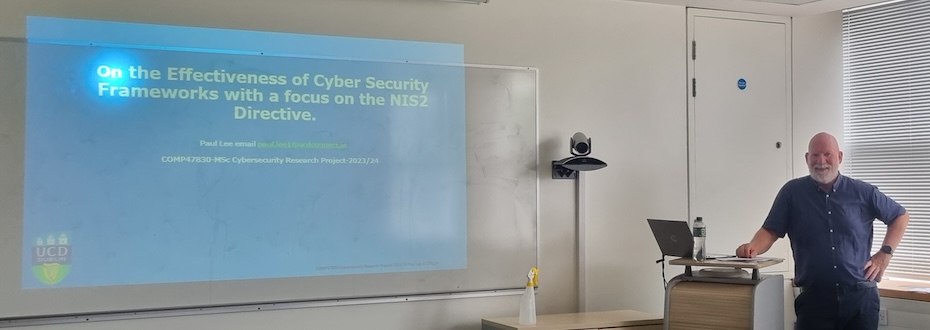
Paul Lee: On the effectiveness of Cyber Security Frameworks in the Irish Public and Private Sector with a specific focus on the implementation of the NIS2 Directive
The project aims to understand the current cybersecurity landscape and the cybersecurity frameworks used in Ireland and other countries. It also aims to understand how the absence of a cybersecurity framework that aligns with NIS2 poses problems to organisations within the scope of the NIS2 directive.
“I chose the project because it was an area of interest for me and I could not find any comparable study in Ireland on the research topic. The (alternative) modules did not cover my specific areas of interest on cyber security legislation. There is so much information available and it was important to be able to filter out all the noise which I found to be difficult as the subject is very mainstream/topical or there are a lot of views/material on the matter. I found that I had to question my assumptions regularly during my research work. My knowledge and perspective on the research were enhanced during the project and reflected in a high-quality final research project. I loved attending the lectures in UCD and it was great to be able to make friends with a great group of students.”
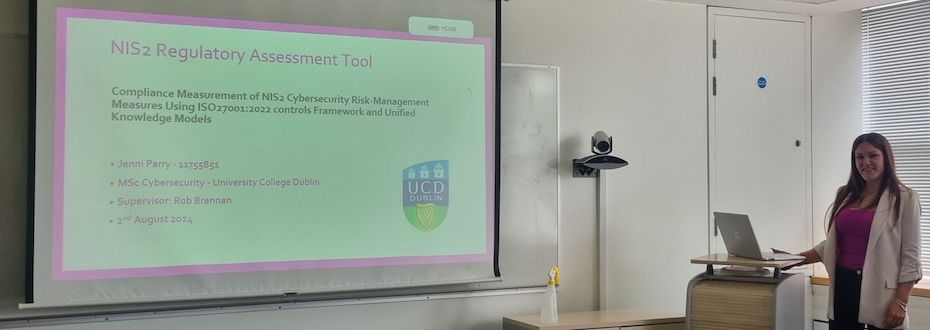
Jenni Parry: Unified Knowledge Models and Tools for NIS2 Compliance Current approaches to cybersecurity risk modelling, assessment, compliance checking and reporting use diverse tools and data formats
Higher compliance reporting will be standardised through NIS2, but most tools have no common vocabulary to use for machine-readable reports that could be automatically processed by regulators. The project extends the W3C Community Group Data Protection Vocabulary (DPV) for NIS2 compliance reporting use cases focused on cyber risk assessment. It develops a proof of concept compliance tool, report or visualization that leverages the extended DPV. Finally, a case study was conducted to assess NIS2 compliance reporting using the extended DPV in an industrial setting.
Talking about her Research Project Jenni says “For me it was a simple choice to do the Research Project as the (alternative modules) were very technical. One of the best things about this master’s program is the mix of technical and non-technical modules, such as Cyber Law (Regulation) and the Risks and Standards module. I work in Governance, Risk and Compliance (GRC) so the non-technical modules have really helped with my career – for example learning about NIST and ISO frameworks and the implications of the new NIS2 Directive. Time management is crucial – make a plan with realistic timeframes and try stick with it. Regular meetings with your project supervisor are essential and great for keeping you on track. Be aware that it will take over a couple of months of your life – however it is completely worth it.”
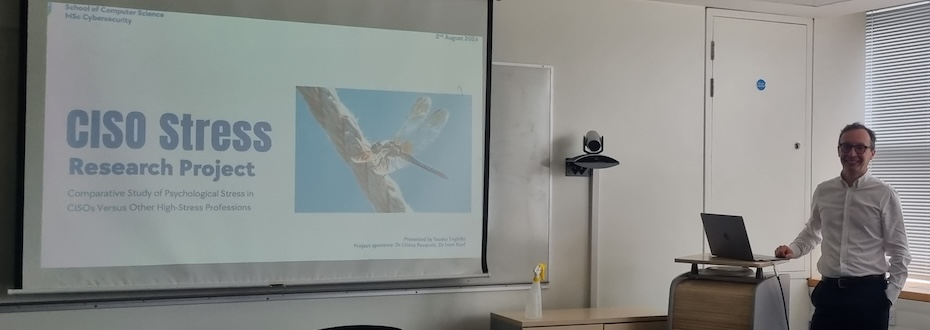
Fausto Teghillo: Unique characteristics of the CISO role and their impact on Stress and Burnout
This research project aims to explore the psychological stress experienced by Chief Information Security Officers (CISOs) and to identify the unique characteristics of the role that contribute to stress and burnout. The study seeks to understand if the nature of stress in cybersecurity, particularly the responsibility for preventing and responding to cybersecurity incidents, uniquely impacts the mental well-being of CISOs.
Fausto’s experience of his Research Project? “I discovered the universe of enlightening research and interesting, forward-looking ideas out there. I also discovered that I enjoy writing. It is tough but gratifying; you just need to find the right pace and the discipline to do it one step at a time.”
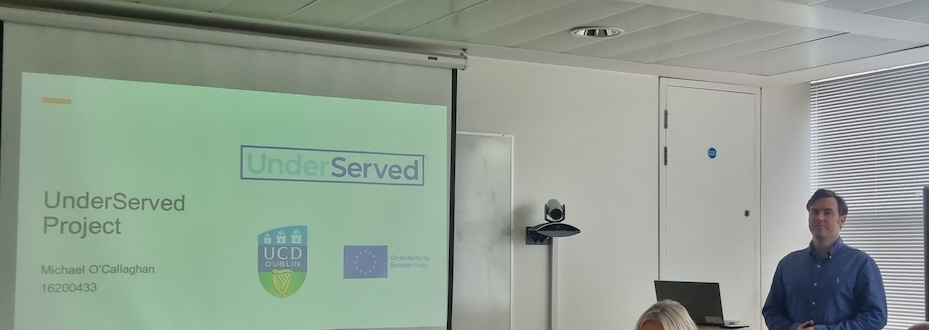
Michael O'Callaghan: UnderServed Project
This project investigates the development and implementation of the UnderServed platform, a tailored and simplified cybersecurity solution designed to enhance threat detection and response capabilities in resource-constrained non-governmental organisations (NGOs). The primary aim is to bridge the
significant cybersecurity gap NGOs face due to their limited resources and technical expertise.
“The reason I chose a project was twofold: Firstly, in some countries, an MSc is not recognised unless it includes a thesis component. Secondly, on a personal level, I believed that completing a thesis would provide valuable experience, such as practising and improving my academic writing skills. (It’s) a personal choice. There are pros and cons to both approaches. I previously completed an MSc and opted for taught modules, which I found highly beneficial. However, I can understand why some might prefer the thesis route for the hands-on experience in research and writing. Both options offer valuable learning experiences, depending on one's goals and preferences. Discerning which research papers are pertinent to your project and identifying those of high quality can be challenging, but it's an essential skill. My writing skills improved significantly during the process, especially through using LaTeX, which is a valuable tool for structuring documents. Additionally, conducting a research project boosted my confidence, as it requires self-reliance—unlike taught modules, there's no direct lecturer support or study groups to rely on, which enhances your independence and problem-solving abilities.”
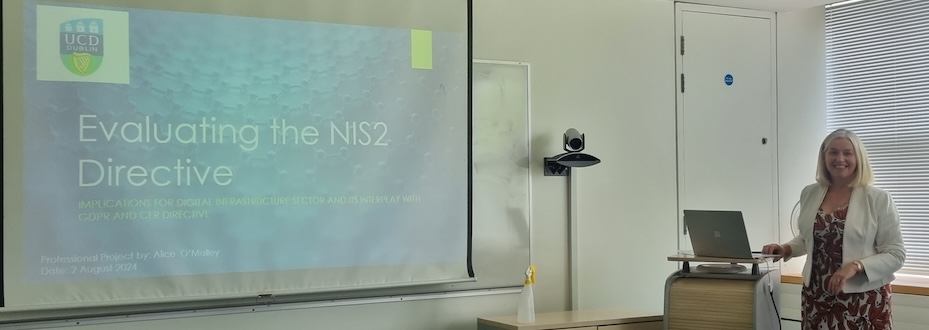
Alice O'Malley: Evaluating the NIS2 Directive
This project aims to assess the direct and indirect impacts of the NIS2 Directive on the digital infrastructure sector, with a particular focus on supply chain management. The project evaluated the compatibility and potential overlaps between NIS2 and other EU legislative frameworks, namely DORA, CER (non-cyber risks), and GDPR. It identified best practices and strategic approaches for digital infrastructure entities to comply with NIS2 while aligning with the requirements of DORA, CER, and GDPR. The final outcome of the project is a framework for enhancing cybersecurity resilience within the digital infrastructure sector through effective supply chain management and legislative synergy.
“My goal was to address a significant compliance challenge that GRC officers must embrace, but typically do not have capacity. By investigating the impact of the NIS2 Directive and its compatibility with other EU frameworks, I was able to leverage the knowledge gained from previous modules. My aim was to uncover actionable insights that would empower emerging sectors to effectively navigate this evolving regulatory landscape.”
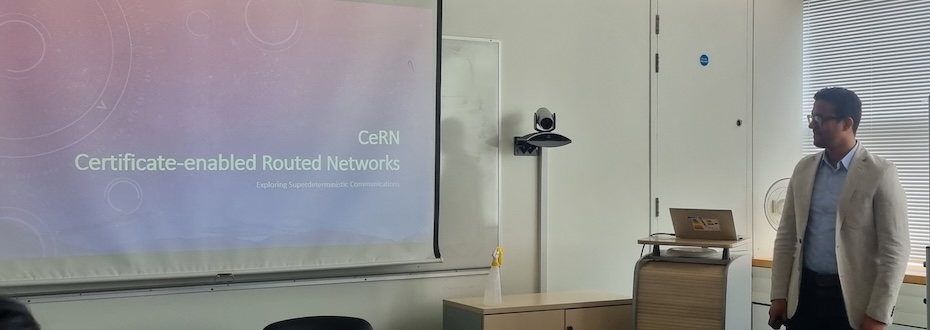
Mohammed Hasanain. CeRN - Certificate-enabled Routed Networks
This projects proposes a Cryptography-enabled Routed Network architecture aimed to achieve trust through the use of certificates and True Random Numbers Generators to influence routing decisions and provide an ultra-low latency for real-time applications of the modern age. Suggested CeRN’s non-exhaustive foundational design principles are: natural cryptography-binding design, L3-L7 Convergence, ultra-low latency, flexible modes of deployment and operation, and backward compatibility with existing global routing infrastructure.
Why did he choose to do a research project? “This reminds me of Robert Frost's "Two roads diverged in a wood, and I - I took the one less traveled by, and that has made all the difference". I just couldn't afford to miss the chance of “standing on the shoulders of giants” as Sir Isaac Newton once wrote to Robert Hooke in 1675, to become of scientific lineage to the likes of Muhammad ibn Musa al-Khwarizmi, Ḥasan Ibn al-Haytham and John Stewart Bell; and to ponder the wonders of our universe.”
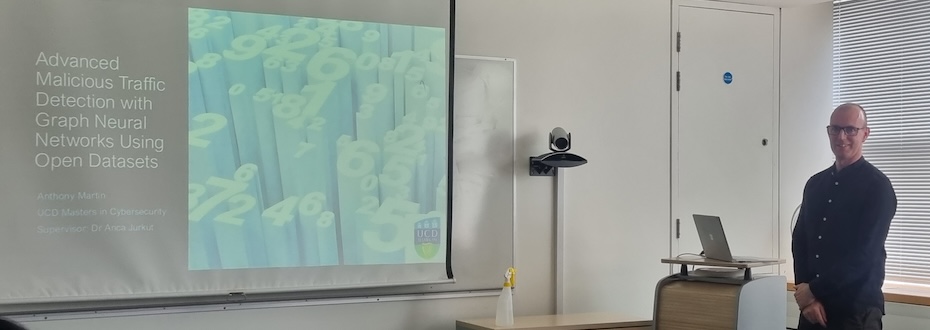
Anthony Martin. Advanced Malicious Traffic Detection with Graph Neural Networks Using Open Datasets
Current methods for identifying and mitigating malicious network traffic often face challenges in accurately detecting complex and evolving threats. By leveraging open datasets, this project aims to develop an advanced detection model, based on graph neural networks, capable of effectively identifying malicious traffic over three diverse network types.
Any advice for someone considering a research project? “I would encourage a future student to examine the career path that they intend to take and base the decision on that. As broad as the course program is, it prepares students for all careers in Cybersecurity, but the final 6 months is the fine-tuning that guides the student down a more focussed path. The research project is a good way to show prospective employers that you can work autonomously, that there's a world of information out there, and there's a lot to be gained from finding that information through research, finding whats relevant and discarding whats not, without that information being curated for the student.”
About the UCD MSc Cybersecurity
Our MSc in Cybersecurity is a two year part-time programme designed to prepare IT professionals for a variety of cyber security roles, including some modules for professionals seeking a managerial role in security. It will help companies, government and state institutions, defence forces and others to upskill their staff to fill new roles in cyber security so that they can protect their organisations, their customers and the public. It is designed to facilitate professional learners through flexible blended study options. Lectures are online and are complemented by occasional full-day workshops on campus. The MSc also offers the option of undertaking a significant piece of research. MSc students take eight core modules and then take one of two paths to completion:
either
three more taught modules and a 15 credit Cybersecurity Case Study;
or
a 30-credit Project, either a Cybersecurity Professional Project or a Cybersecurity Research Project
Graduate Diploma (60 credits) and Graduate Certificate (30 credits) awards are also available. It is also possible to take single modules.
Modules include:
Cyber Risk Assessment and Standards
Cybersecurity Law and Regulation
Cybersecurity Professional Project
Cybersecurity Research Project
Taught modules are available as Microcredentials. Completing a UCD Microcredential course gives you University credit in the form of ECTS (European Credit Transfer System), which means it is recognised across Ireland, Europe and the rest of the world. Full details at www.ucd.ie/microcredentials/
The Government has introduced a Learner Fee Subsidy of 80% to enable more learners to address critical skills gaps and engage with lifelong learning through micro-credentials. This is for a limited time and on a first come basis. More information at https://www.ucd.ie/microcredentials/news/learner-fee-subsidy/
Entry requirements for the Master’s
Minimum of a 2.1 honours bachelor’s degree in Computer Science (or a cognate discipline) or
2:2 honours bachelor’s degree in Computer Science (or a cognate discipline) and equivalent (>5 years) industrial experience in software development or software/system security.
The Graduate Certificate in Cybersecurity is for graduates who wish to pursue a career in management and leadership in cybersecurity and comprises the first 4 modules of the MSc programme. Applicants to the Graduate Certificate who do not meet the above MSc entry criteria may still apply and we will assess each application on its own merits.
You can find more information about the MSc at https://hub.ucd.ie/usis/!W_HU_MENU.P_PUBLISH?p_tag=PROG&MAJR=T380
Our next Master’s intake will be in September 2025. You can now apply for single modules that run in the Spring 2025 term: Leadership in Security and Cybersecurity Law and Regulation. https://www.ucd.ie/microcredentials/explorecourses/cyber-security/
Published 23 September 2024
